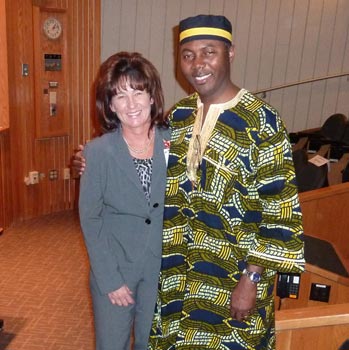 |
|
| Black History Month speaker Chyke Doubeni is pictured here with Karen Mitchell, project coordinator for UMass Memorial Medical Center’s Diversity and Inclusion Office. | |
Although Nigerian native Chyke Doubeni, MD, MPH, associate professor of family medicine & community health, has received national recognition for his professional accomplishments, he has also encountered discrimination in his life journey, and demonstrated perseverance in the face of adversity, as well as extraordinary success. Dr. Doubeni presented “Becoming a Black American: Reflections of a Physician in the African Diaspora” at UMass Memorial Medical Center on Wednesday, Feb. 29, in recognition of Black History Month.
Attired in traditional African kente cloth garb, Doubeni shared his story of becoming a physician/scientist devoted to decreasing health disparities in the United States. “It is nearly 20 years since I first entered this country,” he said. “I am proud to be an American and proud to be a black American.”
Born and raised in a poor village, Doubeni earned entrance into one of Nigeria’s best medical schools by excelling at the national university entrance exam. Education was his ticket to leaving the country, a dream he shared with many young Africans, and he continued to study and work in several countries around the globe. Already an accomplished physician and scientist when he arrived in the United States, Doubeni has since realized career achievements unimaginable to him as a boy in Nigeria.
It was as medical director of a rural community health center in North Carolina that Doubeni was confronted by the extent of health disparities in one of the world’s richest countries, a career-altering experience that compelled him to continue providing primary care and conduct health disparities research. “I finally confronted the darker sides of American society and what it might mean to be black in America—derogatory terms for blacks from the days of slavery were still in use,” he recalled.“The patients I worked with were traumatized by previous and ongoing experiences of discrimination and social injustice, and could not get care because they were blacks, migrant farmers or poor.”
Doubeni was recruited to UMMS in 2004. He is a fellow of the UMMS Faculty Diversity Scholars Program, an initiative of the Office of Faculty Affairs to support faculty diversity, and served one year as the Medical School’s interim associate vice provost for diversity. In 2011, he was named a recipient of the Presidential Early Career Award for Scientists and Engineers, the highest honor bestowed by the U.S. government on outstanding scientists and engineers in the early phases of their independent research careers. Previously funded by the National Cancer Institute to investigate how to improve colorectal cancer treatment and outcomes among black Americans, Doubeni is currently principal investigator on several more studies to identify and reduce racial disparities in American health care.
Further contemplating the meaning of race in America and articulating a vision for an ever-increasing blurring of distinctions real and perceived, Doubeni compared and contrasted the characteristics, experiences and perceptions of American- and African-born black Americans. “Slavery and social injustice has affected blacks in Africa as it has native-born blacks in America,” he observed. “The history and future of all blacks in America is inexorably tied to that of new immigrants from Africa.”
Related link on UMassMedNow:
UMMS physician recognized as one of nation’s top scientists